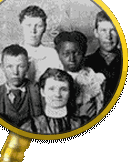Background Information for Teachers
Students are given Student Handout 1-Background Information on Conscientious Objectors during the lesson. You may wish to preview this for a brief historical glance and description of categories of conscientious objectors.
Please also visit the following Historical Marker pages. These will be included in the lesson as reading:
 American Friends Service Committee
American Friends Service Committee
 Bayard Rustin
Bayard Rustin
 Civilian Public Service
Civilian Public Service
All of these Historical Markers can be found in Chapter 1: Mobilization and Opposition , which you may wish to read in its entirety.
For a wonderful outside source about conscientious objection during World War II, see: PBS: THE GOOD WAR And Those Who Refused To Fight It
Please also visit the following Historical Marker pages. These will be included in the lesson as reading:
All of these Historical Markers can be found in Chapter 1: Mobilization and Opposition , which you may wish to read in its entirety.
For a wonderful outside source about conscientious objection during World War II, see: PBS: THE GOOD WAR And Those Who Refused To Fight It
Web Sites
PBS: THE GOOD WAR And Those Who Refused To Fight It
http://www.pbs.org/itvs/thegoodwar/index.html
This PBS website is an excellent source of information about conscientious objection during World War II. It provides contextual and statistical information about conscientious objectors, explores public opinion, and gives examples of all three types of conscientious objectors: non-combatants, absolutists, and alternativists. The site also provides interesting primary sources to investigate: from the diary of a conscientious objector who was the subject of a starvation experiment, to an audio clip of Lew Ayres, a non-combatant who served as a medic in the field.
This PBS website is an excellent source of information about conscientious objection during World War II. It provides contextual and statistical information about conscientious objectors, explores public opinion, and gives examples of all three types of conscientious objectors: non-combatants, absolutists, and alternativists. The site also provides interesting primary sources to investigate: from the diary of a conscientious objector who was the subject of a starvation experiment, to an audio clip of Lew Ayres, a non-combatant who served as a medic in the field.




